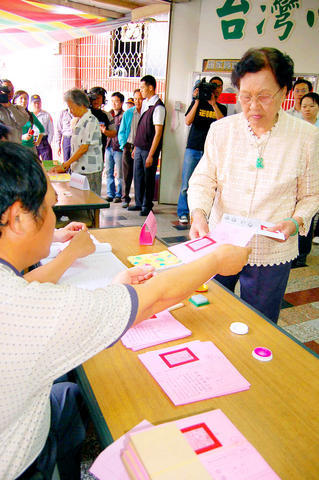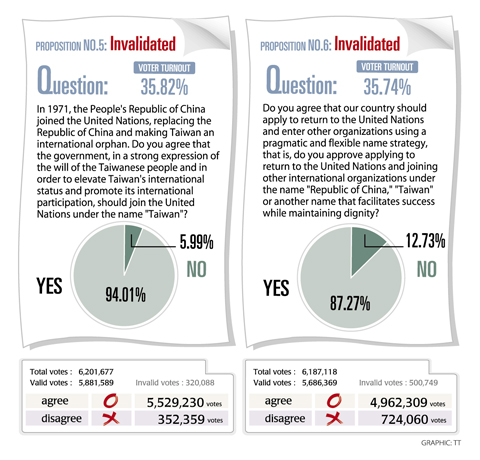The failure of both UN membership referendums could block Taiwan's attempt to participate in international organizations, but may also present an opportunity to reform the referendum system, political observers said.
"The international community may misinterpret what the failure of both referendums means," said Herman Chiang (江岷欽), a public administration professor at Taipei University. "We may think the referendums are not important, but it may have an impact on our future attempts to join international organizations."
On top of serving as a record of what the public thinks on certain subjects, "referendums are used in Taiwan as a tool for political mobilization -- the Democratic Progressive Party [DPP] used its referendum to boost support, while the Chinese Nationalist Party [KMT] used theirs as a counter-mechanism," he said.

PHOTO: YANG MEI-HUNG, TAIPEI TIMES
Lacking a close understanding of the political and social context in the nation, "Western countries may misunderstand the mainstream public opinion in Taiwan," Chiang said.
Tseng Chien-yuan (
"Since even the more conservative option of the two referendum prepositions -- the KMT's `return to the UN' -- did not pass, it will be a problem for the new government to tell the international community what the Taiwanese people really want."

One challenge for the new president will therefore be to explain to the world the real meaning behind the failure of the referendums, Tseng said.
"We have to follow closely how [KMT president elect] Ma Ying-jeou [馬英九] explains to the international community that we long for participation in global affairs," Chiang said.
On the other hand, National Taiwan University political science professor Ger Yeong-kuang (
"[The failure of referendums] will neither have an impact on domestic politics, nor on our participation in international affairs," Ger said.
"For domestic politics, nothing happened when the referendums failed last time," he said. "As for our participating in international organizations, we wouldn't have been accepted right away if the referendums passed and we will continue our efforts even though the referendums fail."
What is of greater importance, Ger said, is for the new president to find a way to make a breakthrough in cross-strait and international relations.
Another concern for observers were potential reforms to the referendum system.
"It would mean that the referendum system is stable if at least one of the referendums passes," Tseng said ahead of the vote.
The outcome, however, went the other way.
"We surely need a reform in the system -- the referendum thresholds may need to be lowered so that the power to make a referendum initiative can really be given back to the people," Chiang said.
"The referendum should no longer be a tool for political mobilization. It's an insult to the system," he said.
While also optimistic about reforms, Tseng said he was worried about the future direction they would take.
"With the KMT dominance [in legislature], the reform may go in the direction of banning the grouping of referendums with elections," he said.
If such a reform occured, it would hurt the referendum system and would be a step backward for democracy, he said.
Eric Suy-Verburg, former under-secretary for the UN's Office of Legal Affairs, said that the DPP referendum "for the time being, is unrealistic."
"In previous UN general assemblies, there were always the same reactions [to reject Taiwan's bid] because of obstruction from the People's Republic of China," he said.
The KMT version, he said, was a bit more "balanced" because it does not call for the rigidity of only applying for full UN membership under a particular name, unlike the one pitched by the DPP.
However, the seasoned politician from Beligum said "there is never a `never' in international politics" and that "things may change."
"Taiwan should find new ways, new avenues and new openings [in its UN bids]. And it should make more friends that support its position. Be patient," he said.
Bruno Kaufmann, president of the Germany-based Initiative and Referendum Institute Europe, questioned if the referendum, as a mechanism for people to express their will, is being fully and correctly used by Taiwanese.
During his tour of polling booths yesterday, Kaufmann noticed that some people were subtly discouraging people from casting referendum ballots by ushering the voters straight to the polling booth, bypassing the table where they could pick up the referendum ballots.
He lamented that neither referendum had succeeded because it only "educates the people not to participate and it rewards the non-participants."
People will become disinterested and jaded about referendums as a mechanism if they persistently see that their affirmative votes do not count, he said.
Eva Tseng (鄭心瑜), a member of the Washington-based lobbist group Formosa Association for Public Affairs' youth group, said that the recent US denounciations of the referendums may have been a major factor in people's apathy toward them.
"It is unfair that the US had a say in the democratic process of another nation," she said.

Beijing could eventually see a full amphibious invasion of Taiwan as the only "prudent" way to bring about unification, the US Department of Defense said in a newly released annual report to Congress. The Pentagon's "Annual Report to Congress: Military and Security Developments Involving the People's Republic of China 2025," was in many ways similar to last year’s report but reorganized the analysis of the options China has to take over Taiwan. Generally, according to the report, Chinese leaders view the People's Liberation Army's (PLA) capabilities for a Taiwan campaign as improving, but they remain uncertain about its readiness to successfully seize

Taiwan is getting a day off on Christmas for the first time in 25 years. The change comes after opposition parties passed a law earlier this year to add or restore five public holidays, including Constitution Day, which falls on today, Dec. 25. The day marks the 1947 adoption of the constitution of the Republic of China, as the government in Taipei is formally known. Back then the Chinese Nationalist Party (KMT) governed China from Nanjing. When the KMT, now an opposition party in Taiwan, passed the legislation on holidays, it said that they would help “commemorate the history of national development.” That

Taiwan has overtaken South Korea this year in per capita income for the first time in 23 years, IMF data showed. Per capita income is a nation’s GDP divided by the total population, used to compare average wealth levels across countries. Taiwan also beat Japan this year on per capita income, after surpassing it for the first time last year, US magazine Newsweek reported yesterday. Across Asia, Taiwan ranked fourth for per capita income at US$37,827 this year due to sustained economic growth, the report said. In the top three spots were Singapore, Macau and Hong Kong, it said. South

Snow fell on Yushan (Jade Mountain, 玉山) yesterday morning as a continental cold air mass sent temperatures below freezing on Taiwan’s tallest peak, the Central Weather Administration (CWA) said. Snowflakes were seen on Yushan’s north peak from 6:28am to 6:38am, but they did not fully cover the ground and no accumulation was recorded, the CWA said. As of 7:42am, the lowest temperature recorded across Taiwan was minus-5.5°C at Yushan’s Fengkou observatory and minus-4.7°C at the Yushan observatory, CWA data showed. On Hehuanshan (合歡山) in Nantou County, a low of 1.3°C was recorded at 6:39pm, when ice pellets fell at Songsyue Lodge (松雪樓), a